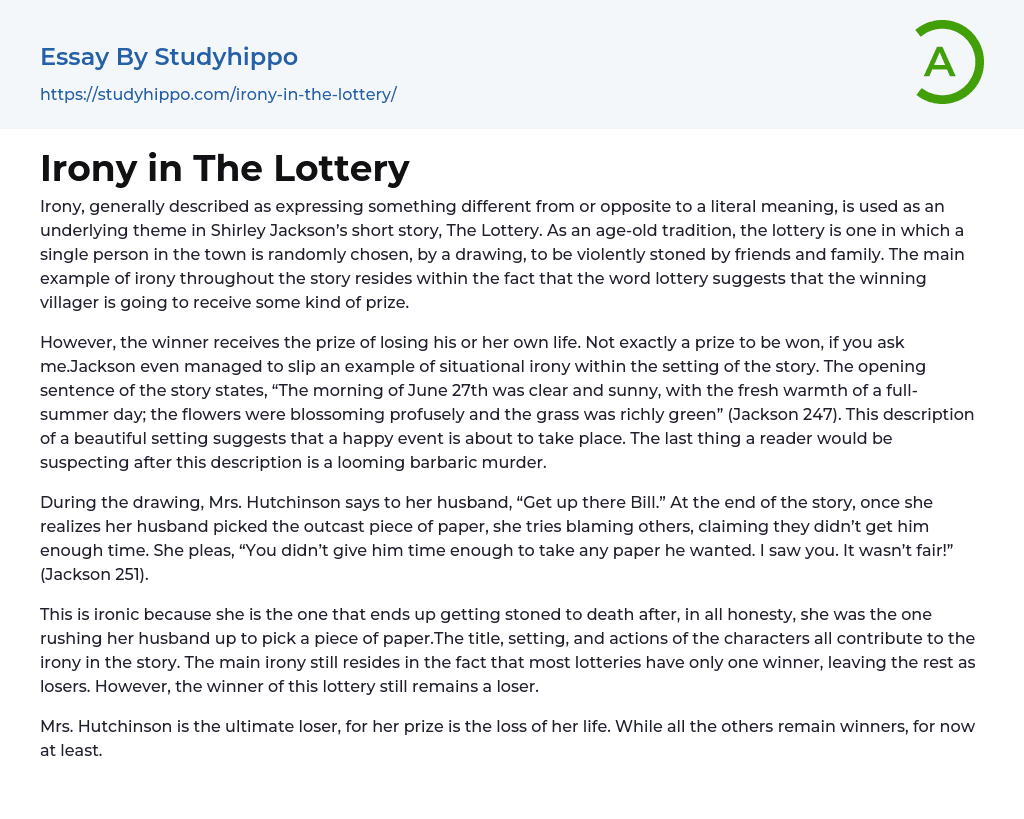Irony, generally described as expressing something different from or opposite to a literal meaning, is used as an underlying theme in Shirley Jackson’s short story, The Lottery. As an age-old tradition, the lottery is one in which a single person in the town is randomly chosen, by a drawing, to be violently stoned by friends and family. The main example of irony throughout the story resides within the fact that the word lottery suggests that the winning villager is going to receive some kind of prize.
However, the winner receives the prize of losing his or her own life. Not exactly a prize to be won, if you ask me.Jackson even managed to slip an example of situational irony within the setting of the story. The opening sentence of the story states, “The morning of June 27th was clear
...and sunny, with the fresh warmth of a full-summer day; the flowers were blossoming profusely and the grass was richly green” (Jackson 247). This description of a beautiful setting suggests that a happy event is about to take place. The last thing a reader would be suspecting after this description is a looming barbaric murder.
During the drawing, Mrs. Hutchinson says to her husband, “Get up there Bill.” At the end of the story, once she realizes her husband picked the outcast piece of paper, she tries blaming others, claiming they didn’t get him enough time. She pleas, “You didn’t give him time enough to take any paper he wanted. I saw you. It wasn’t fair!” (Jackson 251).
This is ironic because she is the one that ends up getting stoned to death after, in all honesty
she was the one rushing her husband up to pick a piece of paper.The title, setting, and actions of the characters all contribute to the irony in the story. The main irony still resides in the fact that most lotteries have only one winner, leaving the rest as losers. However, the winner of this lottery still remains a loser.
Mrs. Hutchinson is the ultimate loser, for her prize is the loss of her life. While all the others remain winners, for now at least.
- Book Summary essays
- Metaphor essays
- Reader essays
- Rhyme essays
- Literary devices essays
- Villain essays
- Books essays
- Genre essays
- Literary Criticism essays
- Writer essays
- Protagonist essays
- Simile essays
- Poem essays
- Book Report essays
- Book Review essays
- Greek Mythology essays
- Plot essays
- Tragic Hero essays
- Coming of Age essays
- Play essays
- Rhetoric essays
- Rhetorical Question essays
- Translation essays
- Understanding essays
- Reason essays
- Character essays
- Letter essays
- American Literature essays
- Literature Review essays
- Utopia essays
- Poetry Analysis essays
- Dante's Inferno essays
- Between The World and Me essays
- Incidents in The Life of a Slave Girl essays
- Flowers for Algernon essays
- Myth essays
- Everyday Use essays
- Boo Radley essays
- Genesis essays
- Richard iii essays
- Alice in Wonderland essays
- On the road essays
- Ozymandias essays
- The Nightingale essays
- Holden Caulfield essays
- Animal Farm essays
- 1984 essays
- A Hanging essays
- Shooting An Elephant essays
- A Tale Of Two Cities essays




